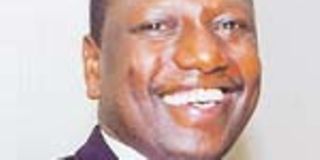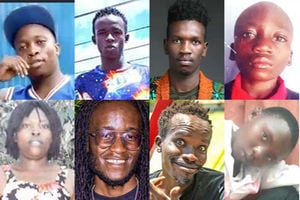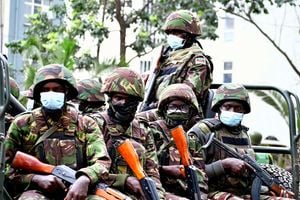Review team backs a powerful President

Mr. Ruto
The present government set up with an all-powerful President may be retained, after all.
The President should hold all the reins of power, appoint the Cabinet and run the government on a daily basis, and there is therefore no need for a prime minister with wide authority, says a committee mandated to change the draft of the new Constitution.
Also there is no need for a two-tier parliamentary system, thus doing away with the upper house, or Senate, envisaged in the draft approved by the Constitution delegates who met at the Bomas of Kenya.
The present government structure should be retained, the new committee thinks, with both central government and local councils.
In addition it recommends that the Provincial Administration should be maintained. It would have been swept away under the proposals in the Bomas draft.
The team proposes new laws to curb the media and states boldly: "Freedom of media is not absolute."
Only Kenyans by birth would be entitled to dual citizenship, it states, compared with the Bomas draft that recommended foreigners married to Kenyans could qualify.
The team agreed to retain the kadhis' courts contained in the Bomas draft – and even decided to find a way to safeguard their interests against any vote rejecting them in a national referendum.
The new proposals, which alter the Bomas draft, have been thrashed out by an 11-member sub-committee of the Parliamentary Select Committee on the Constitution.
Now the full 27-member committee has to consider the ideas which, if approved, will go to Parliament for final approval.
The full committee, chaired by Kanu Eldoret North MP William Ruto, will consider the recommendations during a retreat next month.
The Bomas conference had upheld the people's view that the Provincial Administration should be abolished, but the sub-committee, chaired by Kanu North Horr MP Bonaya Godana, suggests it should be retained with only a few changes.
The Bomas draft had proposed four levels of government which critics viewed as too much government, compounding the problems of bureaucracy. Under Bomas, Kenya would have had the central government, then regional governments – the federal system commonly known as majimbo – as well as city and town councils, plus another local authority at district level.
A raft of recommendations contained in the sub-committee's 17-page report overturns the Bomas suggestion that executive powers should be split between the President and a prime minister.
"Members were unanimous that the presidential system should be adopted in which the President is both Head of State and head of government," it states.
The sub-committee remained silent on the role of the prime minister, however, suggesting only that the power of the President should be checked by Parliament and other constitutional bodies.
But the team failed to agree whether the President should appoint his Cabinet from Parliament or if it could include professionals from outside the House.
Most members argued that if the presidential system were to be retained, the President should pick his Cabinet from outside Parliament. Others insisted that the President could choose only from MPs.
Mr Ruto's select committee set up the sub-committee last August with the mandate to create consensus on the chapters considered contentious.
Other members of Dr Godana's sub-committee were assistant ministers Moses Wetangula, Kivutha Kibwana and Kipkalya Kones, plus MPs Oloo Aringo, Njoki Ndung'u, Henry Kosgei, Mutula Kilonzo, Kenneth Marende and Otieno Kajwang'. Attorney General Amos Wako was also a member.
Among chapters of the Bomas draft considered contentious were those on the Bill of Rights, the Judiciary, Citizenship, the Legislature, the Executive, Devolution, the representation of voters and constitutional commissions.
The team proposed a detailed procedure for a national referendum, drafting a constitutional amendment.
For the avoidance of doubt, Parliament would have power to amend or replace a Constitution, but the entire authority will be vested in the people of Kenya through a national referendum.
They would ratify a new Constitution within 90 days of its enactment by Parliament.
For a new Constitution to be valid, it must receive more than 50 per cent vote nationwide and muster at least 25 per cent in majority provinces – at least five out of eight at present.
Yesterday, Mr Ruto also received the final Bomas draft and an accompanying report from the Constitution of Kenya Review Commission presented by its secretary, Dr Patrick Lumumba.
The issue of a prime minister has been a bone of contention among key Narc partners, the Liberal Democratic Party (LDP) and National Alliance (Party) of Kenya (NAK).
While the LDP favours a powerful premier, NAK has pushed for the current system to be retained.



